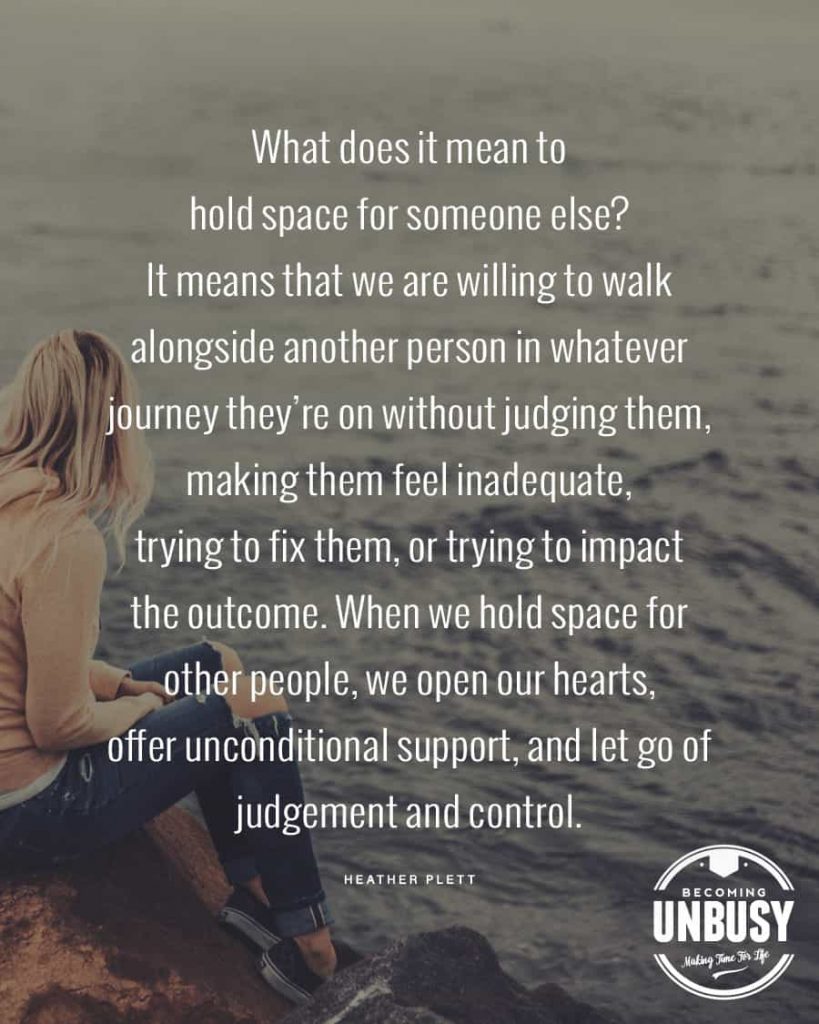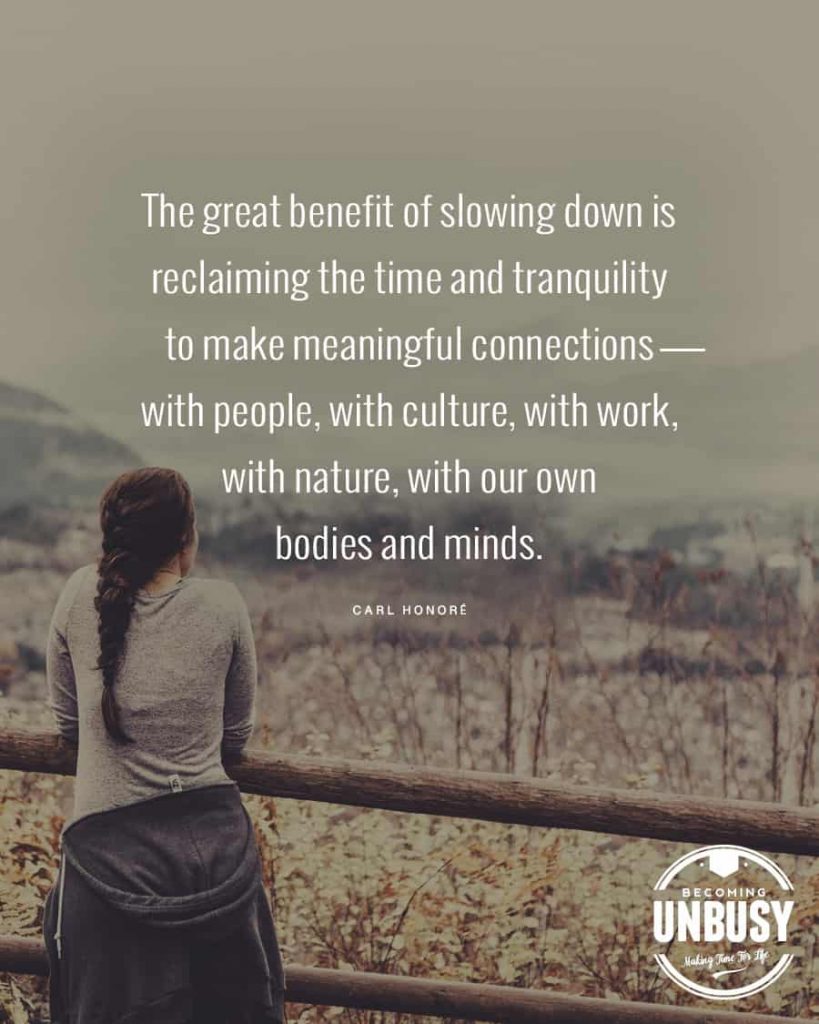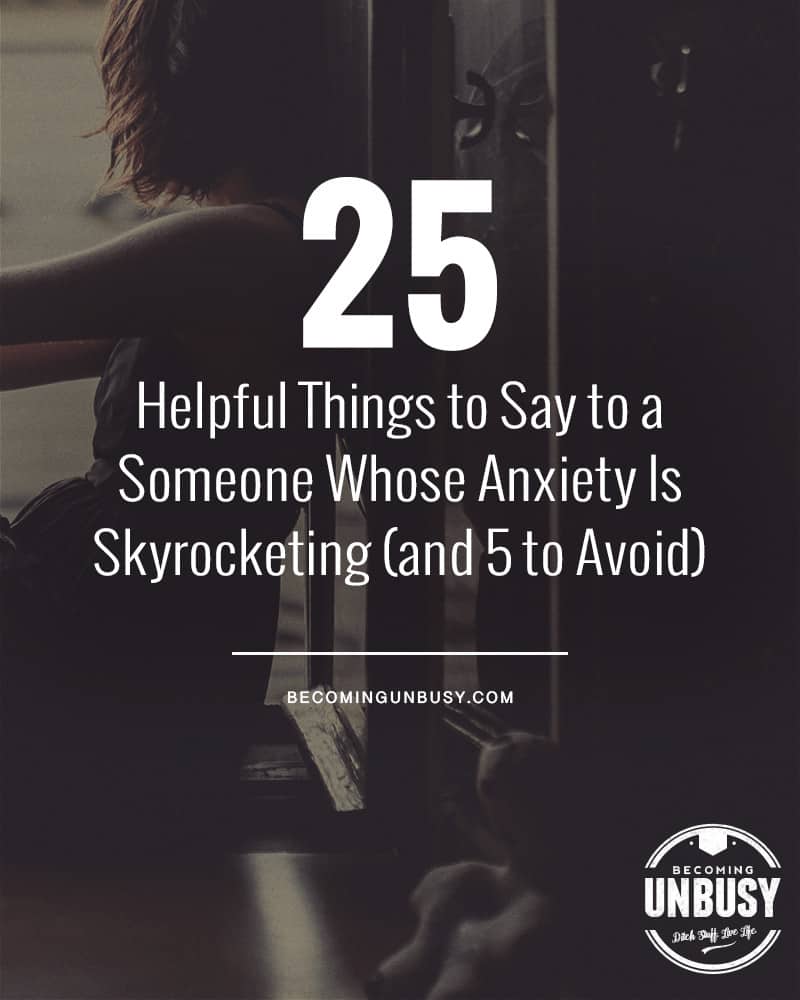Nearly one in three American adults will experience strong anxiety at some point in their lives. We live in a chaotic world; the odds are pretty high that anxiety is part of your life or that of someone you love.
If you’ve ever been around a friend who is spiraling, a partner whose anxiety is causing them distress, or the recipient of panicked texts—you get how awful it can feel to see someone you care about in pain and not know how to respond.
Below are twenty-five helpful things you can say to hold space for someone who is struggling with anxiety.
You can support someone struggling with anxiety by "holding space" for them
There are three steps to supporting someone who is struggling, explains Whitney Goodman, LMFT, "Show up, listen, be patient" and perhaps most importantly, always ask before giving advice.
In other words, the best thing you can do for someone struggling with anxiety is hold space for them.
What does it mean to hold space for someone?
Heather Plett, the author of the book Pathfinder, explains...
Holding space for someone means that we are willing to walk alongside another person in whatever journey they’re on without judging them, making them feel inadequate, trying to fix them, or trying to impact the outcome. When we hold space for other people, we open our hearts, offer unconditional support, and let go of judgement and control.

There are different types and levels of anxiety, but the underlying foundation of them all is the same: excessive worry and fear that can make daily life feel like a battle.
In an effort to help out, we did some research and pulled together expert advice about exactly what to say to hold space for someone when their anxiety is getting particularly severe—as well as a few responses you should avoid too.
What To Say To Someone With Anxiety
Here are twenty helpful things you can say to hold space for someone who is struggling with anxiety.
- I am here with you.
- I wish I could take this pain away.
- This is a lot right now.
- I don't know what to say, but I am here for you.
- It's ok if you don't feel like being strong today.
- I'm here for you, and I'm not going anywhere.
- I'm always here for you.
- This really sucks.
- I am grateful to be here with you.
- You are not alone in how you feel.
- Let's sort through this together.
- Worrying is helpful, sometimes.
- I know a lot can go wrong; what could go right?
- I know this is hard.
- This is hard.
- Your worries are not silly.
- We're going for a walk.
- Would it help if I just sat here with you?
- I'm going to stay with you through this.
- You don't have to do this by yourself; I'm here with you.
- You're not alone.
- I love you, no matter what's going on.
- We'll navigate through this together.
- What's the first piece we need to worry about?
- It's hard to be positive right now; I'm putting out good energy into the world for you.
Five things to avoid saying to an anxious person
Above are comforting words for someone with anxiety, here are five things that you might feel are encouraging or helpful, but end up creating more anxiety or make a person feel dismissed.
- Are you ok?
- Don't stress.
- So many people have it worse than you; think of all you have.
- Everyone gets stressed sometimes — this is normal.
- Have you tried meditation/yoga/[insert some other wellness trend here]?
The bottom line
No one’s perfect, and you’re trying your absolute hardest. It’s ok not to know what to do and to worry you might have said the wrong thing to someone you care about who’s really going through it.
What matters most is that by reading this, and putting these phrases into your back pocket, you're making a commitment to be there through the ups and the downs that anxiety creates — your person, the one you care about, they can feel this and know you’ll be there too.

P.S. When my anxiety became debilitating, I was forced to start asking myself what self-care really looks like. Over time, I began making changes to find peace on a chaotic day, to add white space to our family calendar, and to move toward an unbusy life. My new motto became “Life is short. Love your people.”
Becoming unbusy is about learning to love yourself enough to slow down.
It's about taking a step back and getting quiet.
It's about being vulnerable.
It’s about taking time to figure out your real desires in life, to listen to that distant inner voice, instead of what society tells you to want.
It’s about intentionally choosing to live YOUR truth.
Carl Honoré explains, "The great benefit of slowing down is reclaiming the time and tranquility to make meaningful connections — with people, with culture, with work, with nature, with our own bodies and minds."
Keep moving toward an unbusy life. You've got this.
Sometimes anxiety tells me I am being lazy. Anxiety is a liar.

Pin this resource for later:

Anxiety Support
If someone you love is struggling, please know you’re not alone and help is truly a call or click away. Here are two resources to help you and your loved ones stay safe and healthy.
- Crisis Text Line is a non-profit that provides free crisis intervention via SMS message, available 24 hours a day, in the US, UK, and Canada.
- National Suicide Prevention Lifeline — Call if you are in need of free crisis resources for you or a loved one.
Important Disclaimer
The contents of the Becoming UnBusy website, such as text, graphics, images, and other material contained on the Becoming UnBusy website (“Content”) are for informational purposes only. The content is not intended to be a substitute for professional advice, diagnosis, or treatment. Always seek the advice of your mental health professional or other qualified health providers with any questions you may have regarding your condition. Never disregard professional advice or delay in seeking it because of something you have read on the Becoming UnBusy website.
If you are in crisis or you think you may have an emergency, call your doctor or 911 immediately. If you’re having suicidal thoughts, call 1-800-273-TALK (8255) to talk to a skilled, trained counselor at a crisis center in your area at any time (National Suicide Prevention Lifeline). If you are located outside the United States, call your local emergency line immediately.
Reliance on any information provided by Becoming UnBusy, others appearing on the website at the invitation of Becoming UnBusy, or other visitors to the website is solely at your own risk.
The website and the content are provided on an “as is” basis.



